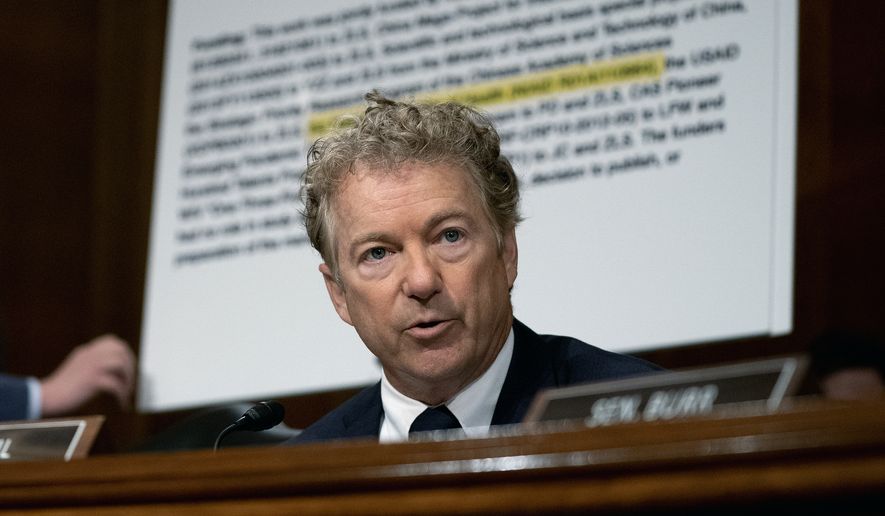Senate Republicans on Thursday blocked the final passage of a measure to create domestic terrorism units in the FBI, Department of Homeland Security and Justice Department.
The bill, which the House recently passed in a near party-line 222-203 vote, was part of the Democrats’ renewed push against domestic terrorism and racist extremism in the wake of a mass shooting at a grocery store in a Black neighborhood in Buffalo, New York.
The bill gained added significance ahead of the Senate vote with Tuesday’s mass shooting at an elementary school in Uvalde, Texas, which killed 19 students and two teachers.
Senate Majority Leader Charles E. Schumer, New York Democrat, urged the GOP to move the domestic terrorism bill forward and open a broader debate on gun laws.
“Today is the day we can begin to debate on how to make these shootings less likely,” Mr. Schumer said before the vote. “And there’s additional benefit to moving forward today. It’s a chance to have a larger debate and consider amendments for gun safety legislation in general, not just for those motivated by racism.”
Republicans said the federal government already has the tools to combat the threat of domestic terrorism. They also warned that the measure was a ploy for Democrats to target conservatives.
In addition to creating special units to investigate domestic terrorism cases, the bill also would have established a task force to address White supremacy in the military and would have required the FBI, DHS and DOJ to report to Congress the threat posed by White supremacists and neo-Nazis infiltrating law enforcement agencies.
“Today we will have a bill before us ostensibly titled and ostensibly about the subject of domestic terrorism,” Sen. Rand Paul, Kentucky Republican, said during the debate on the legislation. “But this bill would more accurately be called, the Democrat plan to brand and insult our police and soldiers as White supremacists and neo-Nazis. How insulting.”
The bill was halted in the evenly split Senate in a 47-47 vote, failing to reach the 60-vote threshold needed for most legislation to survive in the upper chamber. Six senators did not vote.
While the bill was all but guaranteed to fail, Senate Democrats nonetheless used the vote as a sounding board to paint the GOP as a party of extremists.
“Every single House Republican voted against this bill last week,” Mr. Schumer said earlier this week — ignoring for rhetorical purposes, apparently, the lone GOP supporter, Rep. Adam Kinzinger of Illinois. “If you wanted some proof that the MAGA wing of the Republican Party is taking over the whole party, there it is.”
The legislation initially stalled in the House over opposition from members of the far-left “Squad” who had concerns that the federal government lacks a clear definition of what constitutes a “domestic terrorist.” They warned it could be turned against Muslims or other marginalized communities by a future Republican administration.
Democrats reinvigorated the bill two days after the Buffalo attack that left 10 dead, acting on House Speaker Nancy Pelosi’s vow to consider additional measures to “strengthen efforts to combat domestic terrorism.”
Soon after the shooting, Democrats and some Republicans blamed members of the GOP and conservative media outlets for the spread of the “Great Replacement” theory, which holds that there is a plan for non-White people to infiltrate America and displace White people and diminish their political influence. The lawmakers said the spread of the ideology led to the shooting.
President Biden echoed those sentiments while visiting Buffalo, where he mourned the shooting as a “simple and straightforward” act of domestic terrorism, though stopped short of directly blaming Republicans.
“White supremacy is a poison … running through our body politic,” Mr. Biden said. “It’s been allowed to fester and grow right in front of our eyes.”
He also said, “We have to refuse to live in a country where fear and lies are packaged for power and for profit.”
Mr. Biden last year announced a sweeping strategy to deal with threats that, according to the administration, emerge from “racially or ethnically motivated violent extremists and networks whose racial, ethnic, or religious hatred leads them towards violence.”
The Department of Homeland Security deemed the threat of “racially or ethnically motivated violent extremists” a “national threat priority.”
In January, the Justice Department announced the formation of a specialized unit to combat domestic terrorism, saying FBI investigations into violent extremism have more than doubled since March 2020.
Mr. Biden’s approach has raised concerns among Republican lawmakers, who accuse the administration of ignoring left-wing violence and leveraging fears of right-wing terrorism to target political opponents and stifle legitimate debate.
• Joseph Clark can be reached at jclark@washingtontimes.com.




Please read our comment policy before commenting.